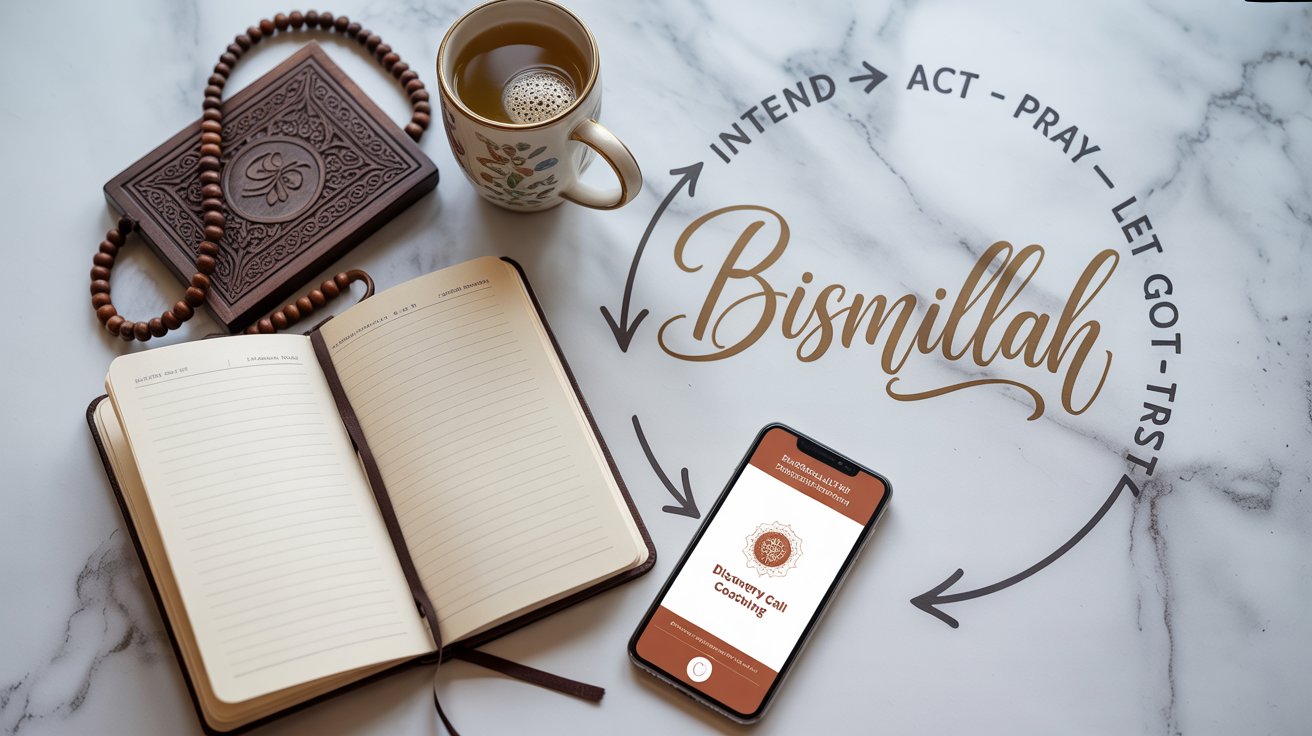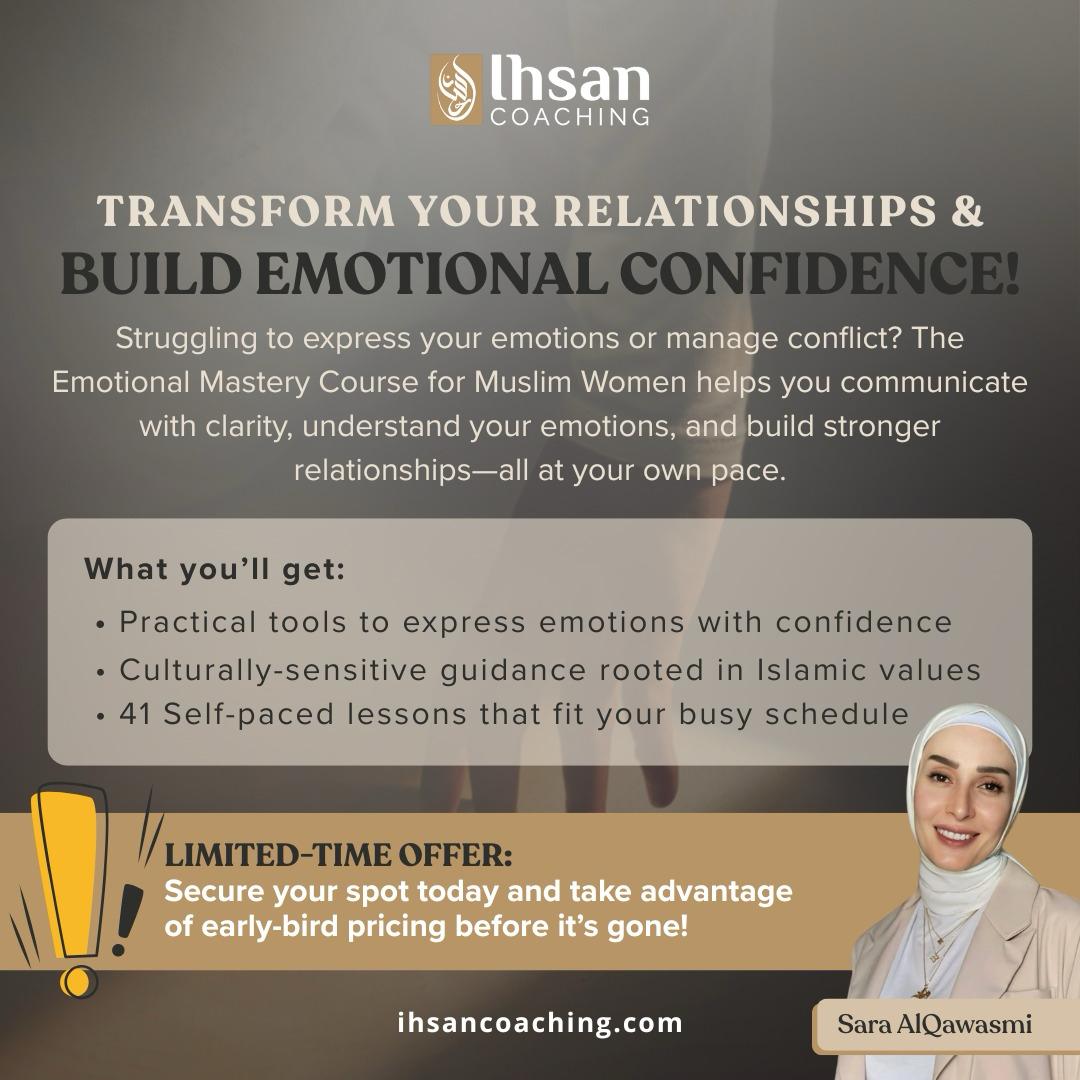Trust in Allah… but what happens when your heart still feels restless?
You know what Tawakkul is. You’ve read the verses. You’ve heard the lectures. But when life throws curveballs, job loss, marriage problems, health scares, suddenly trusting Allah becomes easier said than done. That deep, rooted peace everyone talks about? It feels out of reach.
How Faith–Based Coaching Can Guide Your Journey
If you’re struggling with letting go and letting God, you’re not alone, and you don’t have to figure it out alone either.
Let’s dive into the real meaning of Tawakkul, what Allah says about it, how to practice it in daily life, and how Ihsan Coaching can walk with you as you learn to trust deeply, while still taking meaningful action.
What is Tawakkul? And What Does the Qur’an Say?
Tawakkul means placing your complete trust and reliance on Allah while actively doing your part. It’s not passive surrender, it’s empowered faith.
Allah reminds us in the Qur’an:
وَمَن يَتَوَكَّلْ عَلَى ٱللَّهِ فَهُوَ حَسْبُهُۥ
“And whoever puts his trust in Allah, then He will suffice him.”
(Surah At, Talaq, 65:3)
This verse beautifully shows that trust in Allah isn’t about abandoning effort. It’s about knowing that after you’ve done your best, Allah will take care of the rest in ways you can’t imagine.
Another verse states:
وَتَوَكَّلْ عَلَى ٱللَّهِ ۚ إِنَّ ٱللَّهَ يُحِبُّ ٱلْمُتَوَكِّلِينَ
“Put your trust in Allah. Surely, Allah loves those who trust (in Him).”
(Surah Al, Imran, 3:159)
Tawakkul is a love language with our Creator, an act of the heart that says, “I know You’ve got me, even when I don’t see the outcome.”
The Real Struggles Behind Trusting Allah
Even with strong faith, many Muslims silently struggle with:
- Anxiety about the future
- Overthinking every decision (What if it goes wrong?)
- Fear of failure or loss
- Trying to control every outcome
- Guilt for not being “faithful enough”
If you’ve ever thought, “Am I not trusting Allah enough?” , you’re not failing. You’re just human. Tawakkul is not automatic. It’s a skill. A mindset. A practice. And yes, it can be coached and nurtured.

How to Practice Tawakkul in Real Life?
Here’s a grounded, step, by, step way to make Tawakkul part of your lifestyle:
1- Make a Sincere Intention
Before taking any step, set your intention to please Allah and follow His guidance. This anchors your actions in spiritual purpose.
2- Take the Necessary Means (Asbab)
The Prophet Muhammad ﷺ said:
“Tie your camel and trust in Allah.”
(Tirmidhi)
Tawakkul doesn’t mean leaving your camel untied. Apply for that job. Go to therapy. Set boundaries. Tawakkul means taking action, then releasing attachment to the result.
3- Do Dua Like You Mean It
Dua is the fuel of Tawakkul. Pour your heart out to Allah. Ask Him for clarity, strength, and guidance, but then leave the outcome to Him.
4- Let Go of the “What Ifs”
Tawakkul teaches us that Allah’s plan is always superior to ours, even if we don’t understand it yet. Obsessing over “what if” scenarios will only paralyze your progress.
5- Practice Daily Surrender
In your salah. In your dhikr. In your silent moments. Repeat:
حَسْبُنَا ٱللَّهُ وَنِعْمَ ٱلْوَكِيلُ
“Hasbunallahu wa ni’mal wakeel”
(Allah is sufficient for us, and He is the best disposer of affairs.)
How to Practice Tawakkul in Real Life (In, Depth)
Step 1: Purify Your Intention (Niyyah)
Everything in Islam starts with intention. When facing a challenge, like choosing a career, deciding on marriage, or healing from trauma, ask yourself:
“Is my decision seeking the pleasure of Allah or just the approval of people?”
Practical Action
- Before making a decision, write your intention down in a journal.
- Read this dua:
- “O Allah, make this decision good for me in my faith, my life, and my outcome.”
Qur’anic Anchor
قُلْ إِنَّ صَلَاتِى وَنُسُكِى وَمَحْيَاىَ وَمَمَاتِى لِلَّهِ رَبِّ ٱلْعَـٰلَمِينَ
“Say, ‘Indeed, my prayer, my rites of sacrifice, my living and my dying are for Allah, Lord of the worlds.’”
(Surah Al, An’am, 6:162)
Step 2: Take the Means (Asbab) Seriously
This is where most people get Tawakkul confused. Trusting Allah doesn’t mean waiting passively for a miracle. It means taking practical steps with spiritual consciousness.
Examples of Taking the Means
- Wanting to get married? Start counseling, talk to trusted elders, make your criteria clear.
- Need to heal from emotional pain? Seek therapy, make dhikr, read relevant books.
- Looking for a job? Apply, network, upgrade your skills, but don’t rely solely on them.
The Prophet ﷺ never sat back and said, “Allah will do it.” He planned, prepared, and acted, then relied.
Hadith Reminder:
A man said, “Shall I tie my camel and trust in Allah, or leave it untied and trust in Allah?”
The Prophet ﷺ replied, “Tie it and trust in Allah.” (Tirmidhi)
Step 3: Trust While You’re Waiting
This is the hardest part, when you’ve done everything and the results still haven’t come.
You might think:
- “Did I make the wrong choice?”
- “What if Allah isn’t happy with me?”
- “Why is it taking so long?”
This is where Tawakkul truly begins. Trust is not proven in action, it’s proven in waiting.
What to Practice?
Keep making duas like:
حَسْبِىَ ٱللَّهُ لَآ إِلَـٰهَ إِلَّا هُوَۖ
“Allah is sufficient for me; there is no deity except Him…” (Surah At, Tawbah, 9:129)
Repeat: “My Rabb knows, even if I don’t.”
Reflect on a time something didn’t go your way but later turned out better.
Coaching Tip
Your coach can help you sit in the waiting without spiraling. They help you build emotional tools and patience aligned with your faith.
Step 4: Surrender the Outcome Without Regret
Tawakkul teaches that once you’ve tried your best, release control of the result. Even if things don’t go your way, they always go Allah’s way, and His plan is wiser than yours.
Example: You applied to ten jobs, prayed Istikhara, and got rejected from all, but three months later, a better role appears that suits your deen and dunya perfectly. That was Allah’s plan working when yours fell apart.
Qur’anic Wisdom:
…وَعَسَىٰٓ أَن تَكْرَهُوا۟ شَيْـًۭٔا وَهُوَ خَيْرٌۭ لَّكُمْ ۖ وَعَسَىٰٓ أَن تُحِبُّوا۟ شَيْـًۭٔا وَهُوَ شَرٌّۭ لَّكُمْ ۗ وَٱللَّهُ يَعْلَمُ وَأَنتُمْ لَا تَعْلَمُونَ
“…Perhaps you hate a thing and it is good for you; and perhaps you love a thing and it is bad for you. And Allah Knows, while you know not.”
(Surah Al, Baqarah, 2:216)
Step 5: Repeat the Cycle with Ihsan (Excellence)
Tawakkul is not a one, time thing. It’s a spiritual cycle you repeat in every life decision:
- Intend
- Take the means
- Trust in the wait
- Surrender the outcome
- Reflect & grow
- Repeat with deeper faith
Just like muscles, trust in Allah grows stronger the more you use it.

Bonus Daily Practices to Strengthen Tawakkul
Here are simple, soul, enriching practices that help you develop Tawakkul over time:
- Tawakkul Journal
Every night, write one worry and one proof that Allah handled something better than you expected.
- Tawakkul Dhikr Routine
After Fajr, repeat “Hasbunallahu wa ni’mal wakeel” 100 times.
- Tawakkul Trigger Phrase
Every time anxiety strikes, say:
- “Ya Allah, I leave this to You. I will do my part. I trust You with the rest.”
You’re Not Meant to Walk This Alone
Even the Prophet ﷺ had companions. Even the most pious had moments of doubt.
You were never meant to figure everything out on your own. And trusting Allah doesn’t mean ignoring the help He sends your way.
At Ihsan Coaching, we walk alongside you heart-first, faith-centered, and solution-focused.
Ready to Strengthen Your Tawakkul?
You’ve done the reading. You’ve made the duas. Now it’s time to take aligned action.
Whether you’re making a major life decision, recovering from loss, or just feeling emotionally stuck, Ihsan Coaching helps you reconnect with the kind of Tawakkul that leads to peace, purpose, and power. Book your first discovery session today and let your journey back to trust begin, with clarity, faith, and compassionate coaching by your side.
Frequently Asked Questions
1- Is it wrong to feel anxious if I have Tawakkul?
No, it’s not wrong, it’s human. Even Prophet Musa (AS) felt anxious when Pharaoh’s army chased him. Tawakkul doesn’t erase emotions; it teaches you to rise above them with trust in Allah’s plan.
2- Can coaching really help me strengthen my faith?
Absolutely. A qualified faith-based coach won’t replace your religious obligations, they’ll enhance them. By helping you understand your emotions, mindset, and decisions through an Islamic lens, coaching becomes a tool for both emotional and spiritual alignment.
3- How is Tawakkul different from just hoping things work out?
Hope is passive. Tawakkul is active. It combines effort with trust. You do your part (take the means) and then release attachment to the result, knowing Allah’s wisdom is supreme.
4- Is coaching confidential and judgment, free?
Yes. At Ihsan Coaching, your privacy is sacred. You’ll experience a compassionate, non-judgmental space where your story is respected and your goals are honored.
5- What if I don’t know what I need help with; can I still benefit?
Definitely. You don’t need to have all the answers. Coaching is designed to help you find the right questions, explore your inner world, and discover where your growth is calling you.




